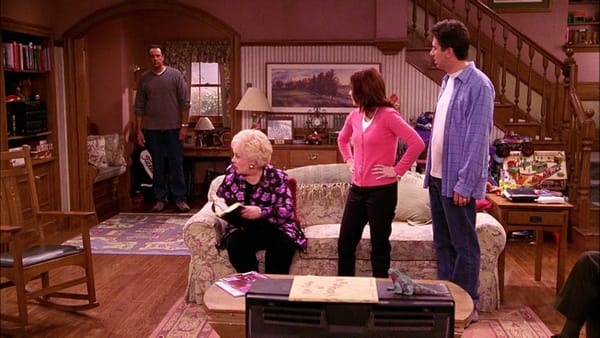In which I am a TV character
Depersonalization does weird things to you, folks

(Continued police violence directed against black Americans and the Republican party’s attacks on trans Americans are horrific problems that we, as a nation, are hopefully finally reckoning with. I want to be conscious of the ways in which this is a conversation where my voice isn’t needed as much as the voices of others, so this newsletter is going to stick with its regularly scheduled programming, which in June is a series of Pride posts on trans stuff. But it’s important to use what platform I have to direct you toward organizations that could use your money to actively help the people who need it most. If you have the extra cash, donate it to the Black Trans Emergency Protesters Fund, which helps black trans protestors with medical care, resources, and bail.)
A few weeks ago, I confessed one of my most shameful secrets in the Slack I share with a group of other trans women: For most of my life before coming out, I had thought of myself as a TV character in another universe.
I realize this doesn’t make a ton of sense. “How could someone think they’re a TV character?” you might be thinking. And, yeah, it is kinda weird. But I really did start to organize my life in terms of thinking about what story arcs I must be living through, how they were presented in that other world, which characters were popping, that sort of thing. To be clear: I was aware that I was living an actual life, on this actual planet, making decisions that had actual consequences, moral and otherwise. I didn’t use my sneaking suspicion that I was a fictional character to become a sociopath. I used my sneaking suspicion that I was a fictional character to explain why I wasn’t real. (If this all sounds familiar, I’ve written about it through another lens in this newsletter.)
This was my most closely guarded secret, more closely guarded than my transness in some ways, because it felt incredibly strange and alienating. Who thinks they’re a fictional character? I thought. Seems bad. Weirdly, I had a far easier time believing that all men thought, frequently, about how they’d rather be women than that any other human being on Earth had decided they were a character in a fictional narrative. And that was despite my love for Charlie Kaufman’s movies, which clearly suggest he’s at least thought about it.
From as early as I can remember, I started organizing my life around this idea of being on TV. In my pre-kindergarten days, I imagined myself as the hero of a show roughly based on Scooby Doo, featuring my dog as my faithful companion in monster hunting. But the older I got, the more the stories moved from pretend fancy to what was actually happening to me. The more boring I became, the more I tried to compensate for that by insisting that my life was actually way interesting, actually.

The gap here is, I think, between childhood fantasy — I’m in Scooby Doo — and the slowly growing sense that my entire life was a fiction. In high school, I won a writing competition by writing a story about a boy my age who died, got to visit his writers’ room, then was resurrected because the show couldn’t kill off its protagonist. I needed to believe not that there was a purpose but that I made sense to somebody somewhere, even if they were in another world.
The multiverse was the way I most frequently justified this “other self” to myself — of course if there are an infinite number of universes, there’s an infinite number of them where I’m a character in a TV show, because math is weird. (And, honestly, this is still true. If you have enough universes, everything is true eventually.) It was a psychological crutch, but I wasn’t sure for what. Probably, I thought, the fact that I wasn’t really pursuing my writing career in the way I thought I should.
But guess what? The real reason I had these fantasies was because I had gender dysphoria, and my brain, at an early age, took harsh reprobation from authority figures when I expressed my gender identity as an excuse to splinter and reform itself in a very particular way that avoided thinking about who I really was. But if the me that resulted was just a character, well, that had to mean something, didn’t it?
There’s a phrase in Christianity that I’ve thought about a lot since I began my transition — “abundance of life.” It was a phrase I never quite understood in my old life, because I was a collection of subroutines and writers room hacks pretending to be a person. But now, when I run into a friend at the farmers market or find myself moved to tears by something or just spend a quiet evening at home, there is a centeredness that wasn’t present before.
The shortest description of this feeling is: I know how to be me now. I know what it is to exist as myself. I am no longer performing a simulacrum of a person. I am a person.
Anyway, the point is that when I brought this up in the Slack, I assumed all of my friends would say something like, “Oh, yeah, that sounds tough,” and quietly move on to another topic, but instead, almost all of them revealed that they had done something similar. Most popular was the simulation hypothesis, which posits that we all live in a simulation made by a hyper-advanced civilization (and honestly maybe a simulation inside a simulation inside a simulation inside…), but others had structured their lives to be understood as novels, as games, as other artworks. The common thread was that we were all pretty sure we were fictional until we suddenly weren’t.
Growing up a trans woman is its own form of traumatic experience, one that too often allows for a reconceptualization of the self meant to dull that trauma. To watch as your woman’s body twists and contorts and warps itself against your will is a horrific thing to go through, and so many of us come up with unique ways to survive that pain. In some cases, that involves inventing another self to play for a little bit. But if your defense mechanisms are too strong, you might find yourself playing him for ages and ages and ages.
The trick is to bring those walls down, to realize that even if you’re a TV show in another universe, you can’t live your life as if that’s the case. I felt, for so long, like I was subject to the whims of fate. To realize I wasn’t was bittersweet — having control over myself was amazing. But why had it taken me so long to get there?
What I’ve been up to: I’ve spent most of this week writing a really long piece that should go live on Vox this week. It’s one of the best things I’ve ever written, I think, and I’m so glad I got the chance to write it. But I also wrote a couple of pieces at Vox that actually got published, including this rumination on why leftists are just better at setting political narratives than mainstream liberals right now and this piece on what might next happen with the cop drama.
The classic way to subtweet the cop drama, at least structurally, has typically been the private eye show. Private investigators operate outside of the justice system, which means they’re often as much at odds with law enforcement as they are with people breaking the law. The classic example of the form is the 1970s drama The Rockford Files (where James Garner played the ultimate cool dad of a PI); more recently, the ABC series Stumptown, which just finished its first season, has also told involving mysteries outside the trappings of the traditional cop show format.
There have been other attempts to break open the cop show mold in recent years. By far the most famous of these is The Wire, David Simon’s sprawling depiction of the many organizations and systems rotting away in the city of Baltimore. The show featured a new mystery each season, to be solved by a team of detectives and other officers, but its message was that it’s impossible to be wholly good in a broken system. The morals of The Wire’s many police officer characters ranged from basically decent to hopelessly corrupt, but the show always drove home that even the best of them couldn’t help but be eaten alive by the self-interested, reflexively defensive institution they all worked for.
Read me: Trans women of color have among the lowest life expectancies of anyone in American society, and their lives are too rarely depicted in the American mainstream in any real way. The Out magazine obituary project — which writes obituaries for the trans women of color who die in the US each year — is a beautiful way to honor these women for who they are, not the statistic they represent. Read the 2019 edition here.
Watch me: One of my favorite people preached one of the best sermons I’ve ever heard. Please, please, please watch it. If you are a trans person who felt oppressed by the church, this might be healing for you. It was for me.
And another thing… If you have the money to donate, consider giving to Gays and Lesbians Living in a Transgender Society — GLITS. It’s an organization dedicated to helping the many trans sex workers around the world, who are subject to horrifying dangers each and every day.
Episodes is published once per week and is about whatever I feel like that particular week. Suggest topics for future installments via email or on Twitter. Read more of my work at Vox




